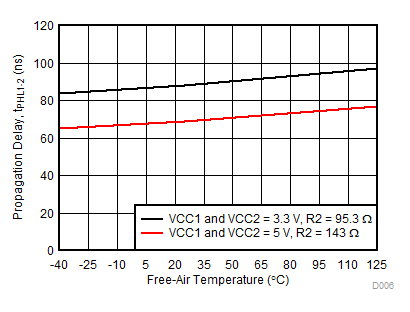SLLSEB6F July 2012 – December 2022 ISO1540 , ISO1541
PRODUCTION DATA
- 1 Features
- 2 Applications
- 3 Description
- 4 Revision History
- 5 Pin Configuration and Functions
-
6 Specifications
- 6.1 Absolute Maximum Ratings
- 6.2 ESD Ratings
- 6.3 Recommended Operating Conditions
- 6.4 Thermal Information
- 6.5 Power Ratings
- 6.6 Insulation Specifications
- 6.7 Safety-Related Certifications
- 6.8 Safety Limiting Values
- 6.9 Electrical Characteristics
- 6.10 Supply Current Characteristics
- 6.11 Timing Requirements
- 6.12 Switching Characteristics
- 6.13 Insulation Characteristics Curves
- 6.14 Typical Characteristics
- 7 Detailed Description
- 8 Application and Implementation
- 9 Power Supply Recommendations
- 10Layout
- 11Device and Documentation Support
- 12Mechanical, Packaging, and Orderable Information
Package Options
Mechanical Data (Package|Pins)
- D|8
Thermal pad, mechanical data (Package|Pins)
Orderable Information
6.14 Typical Characteristics


| VCC1 = 3.3 V | C1 = 40 pF | |
| Fall time measured from 70% to 30% VCC1 | ||

| VCC2 = 3.3 V | C2 = 400 pF | |
| Fall time measured from 70% to 30% VCC2 | ||

| C2 = 10 pF |

| R2 = 2.2 kΩ | C2 = 400 pF |

| C1 = 10 pF |

| R1 = 2.2 kΩ | C1 = 40 pF |

| C1 = 40 pF | C2 = 400 pF | |


| TA = 25°C |

| VCC1 = 5 V | C1 = 40 pF | |
| Fall time measured from 70% to 30% VCC1 | ||

| VCC2 = 5 V | C2 = 400 pF | |
| Fall time measured from 70% to 30% VCC2 | ||

| C2 = 10 pF |

| R2 = 2.2 kΩ | C2 = 400 pF |

| C1 = 10 pF |

| R1 = 2.2 kΩ | C1 = 40 pF |

| C1 = 40 pF | C2 = 400 pF | |
| R1 = 2.2 kΩ | R2 = 2.2 kΩ |